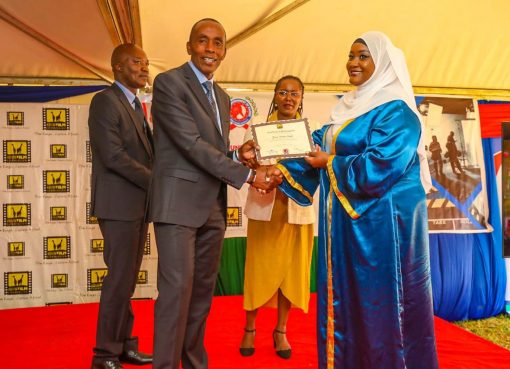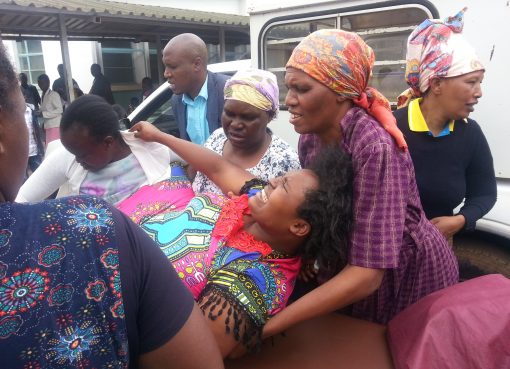The Government has unveiled two digital hubs at the Kakamega County Polytechnic and Shianda Polytechnic in a bid to enhance access to digital technology and enable the youth to learn, connect, and monetise through the Digital space.
The Prime Cabinet Secretary and Cabinet Secretary for Foreign and Diaspora Affairs, Musalia Mudavadi, who led the launch, said the development of high-end Jitume ICT digital hubs is a groundbreaking initiative being implemented by the Konza Technopolis Development Authority, under the Ministry of Information Communications and the Digital Economy in all technical and vocational education training institutes.
He said the initiative is anchored in the Bottom-up Transformation Agenda (BETA) pillar of the digital superhighway and creative economy that seeks to establish 1450 digital hubs across the country to stimulate quality jobs and other livelihood opportunities for the youthful population.
The Prime Cabinet Secretary added that the hubs are important users of the fibre optic that the government has laid across the country, which are vital entry points to the emerging digital economy that is transforming the lives of citizens.
“The digital hub model ensures that everyone within the coverage area, including students, researchers, and small business operators, has access to the Wi-Fi that it provides, in addition to the fibre internet itself. Having Wi-Fi coverage across the entire hub ensures anyone can bring their device to get connected,” he explained.
He added that the free internet provided in the digital hubs enables youth to acquire digital skills and connect to global online learning and e-commerce resources, noting that access to reliable power, either from the national grid or a solar system, will be critical to maximising the impact of the hubs on the local communities.
Mudavadi noted that by opening up the digital space, the government has practically demonstrated that leveraging digital technologies enhances efficiency and stimulates opportunities for socioeconomic transformation.
“We have made incredible progress that has positioned Kenya as a world leader in the digital technology field. From a mere 354 services, the government has on-boarded over 22,000 services on the e-citizen platform. This represents 85 per cent of all the services identified for onboarding,” he noted.
“This is the opportunity we are bringing here for the students and people of Kakamega: you can use the digital hub to work online for companies here in Kenya and overseas; you can promote your goods and services online or create music and films that you can share online and make a decent living. The world of opportunities is right here on your phone, laptop, or whichever other device you are using,” Mudavadi noted.
He said partners will guide the users of the Jitume ICT Digital hubs on how to record podcasts, music, and films with others helping the users to navigate through the global job market, access healthcare information, and entrepreneurship innovation and support services.
The Cabinet Secretary for Information Communications and the Digital Economy, Dr. Margaret Ndung’u, who also graced the launch, said the advancement in technology will empower all Kenyans to leverage digital technology for creativity, productivity, and inclusion.
Dr. Ndung’u noted that the internet offers opportunities to enhance existing livelihoods such as marketing and selling products or services online through social media, websites, or e-commerce platforms.
“When it comes to the services that can be accessed online, the most crucial ones are those that allow our youth to earn an income. It also opens doors to online opportunities, allowing us to tap into national, regional, and international markets to make money from our skills,” she added.
The CS disclosed that a baseline assessment conducted by a team from Strathmore University and the Communication Authority on the digital hub in Kakamega, which has been operational for the past year, revealed significant positive outcomes on the impact to users.
She said that before the establishment of the two digital hubs, ICT access for learners in both Shianda and Kakamega County Polytechnics was only 20 per cent but has now risen to over 80 per cent enabling the implementation of compulsory ICT learning as a common course for all students.
“Notably, the digital hub has clear educational benefits, including increased enrolment, as TVET institutions have become more attractive to youth; the addition of smart screen computers and online content has enhanced the quality and variety of courses offered,” the CS added.
She also noted that, as the government is working on lowering the cost of devices, the digital hubs remain its most effective tool for reaching all Kenyans, as they provide access to essential services and devices that equip individuals with valuable digital skills and offer high-speed internet, ensuring that no one is left behind on the country’s journey towards a digitally empowered society.
“I see immense potential in the digital hubs as centres of innovation and inclusion; my vision for these hubs goes beyond providing computers. I envision a diverse range of equipment, including tools for the creative economy, such as podcasting and videography, to enable our youth to produce and monetise audio and video content,” the CS added.
She also noted that the Digital hubs are equipped with assistive technology devices to ensure that people enabled differently can seamlessly access the internet and particularly fit fully in the digital economy.
The Government has also established and operationalised digital hubs at the Shamberere National Polytechnic, Mumias West Technical Training Institute, Sigalagala National Polytechnic, Khwisero TVC, Chevaywa TVC, and Butere Technical Training Institute in Kakamega County.
Also present during the launch of the Digital Hubs, the town hall meeting, and the Digital Economy Conference were the Principal Secretary State Department for Broadcasting and Telecommunication, Prof. Edward Kisiang’ani; the Principal Secretary State Department for ICT and Digital Economy, Eng. John Tanui; the Principal Secretary State Department for Higher Education and Research, Dr. Beatrice Inyangala; host Governor Fernandes Barasa; and other leaders from partner organizations.
By Moses Wekesa





